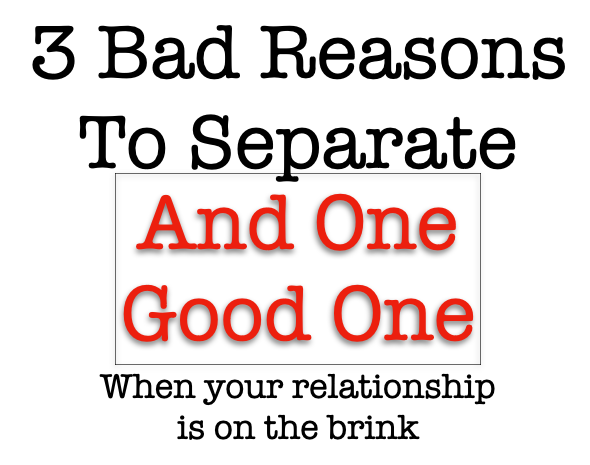QUESTION: I've had enough! I want a divorce! My spouse treats me as if I don't exist, and I have been hurt for too long. I've tried to express how much it hurts when they ignore me, but we keep going around in circles. I don't know what else to do but to leave. Maybe that will get their attention. Do you think I have valid reasons for wanting to separate?
Don: There are 3 REALLY BAD REASONS to push for a separation:
1. For revenge or punishment over emotional hurt. In this situation, you want to teach your partner a lesson so they will care about you more.
2. To let your spouse know you are unhappy.
3. Wanting to avoid facing the real underlying problems.
Your question contains all three BAD reasons. Why are they bad, or better said, unproductive? First, you are using the threat of separation, or the actions of separation, to manipulate them into giving you more positive attention and consideration. And, if this gets you the attention you want, it will be short-lived. Why? Scaring your spouse into giving you positive attention may work in the short run, but your tactics will eventually fail because they will be motivated by fear, not respect for you. You will both still ignore the elephant in the room—the underlying problems in your relationship.
Separation in a marriage can be used for different purposes. For some couples, divorce is the first step when neither person wants to save the marriage. However, separation can also be a way to improve or improve satisfaction in the marriage by giving both parties some space to COOL DOWN, THE ONE GOOD REASON. This kind of separation interrupts more damaging emotional turmoil, allowing the couple to reconnect and discuss from a calmer place. You can then llook for clarity: do you even want to be in this relationship, are you already out the door emotionally, do you want to try again? A COOLING OFF PERIOD can bring what is now most important to you into focus. So, you need to consider your reasons and decide what the separation will be about.
A controlled separation is when you and your spouse understand your reasons for separating. Do you want a divorce, or are you seeking a temporary break to address serious emotional issues and find new ways to improve and strengthen your marriage? If you and your spouse want to work on your marriage, there are specific guidelines you must agree on. Some of the basic guidelines to consider include:
1. Time Limit: For example, three to six months. (Note: It may take at least 30 days to cool off.) Depending on your situation, it might be best to decide not to try to deal with any of the chronic marriage problems until after some time, such as one week, three weeks, or a month--whatever each person needs. This is an excellent time for individual counseling to get yourself centered instead of continuing cycling imaginary circular arguments with your spouse in your head.
2. No attorney filing: Agree that neither of you will file for divorce during this time. This keeps the fear down and allows space for both people to look inside rather than over their shoulders. The exception is if there is domestic violence or a threat. Legal help may be necessary for safety.
3. Someone moves out: Decide who, when, and where. Or, if you choose to try an in-home separation, who sleeps where? Whether out-of-home or in-home, it is essential that each person has a comfortable place to be and sleep. And if there are children, it is explained so they can understand what they see.
4. Allow and encourage fair and equitable use and access to finances.
5. Welfare of children: What is best for them with regular access to both parents?
6. Keep it confidential: Who will be told and who isn’t? Remember that if you are using extended family as support, what you share about your spouse will affect their future family relationship if you choose to stay together.
7. Once COOLED DOWN, spend time together: For example, dinner where marriage problems are not discussed.
8. Having intimate relations: Whether to pause or continue with a sexual relationship with each other.
9. Dating others: This is discouraged. If there is dating with others, it is unlikely the marriage will be able to continue.
10. Terminating the agreement: Whether one spouse can terminate the contract or both must agree.
A controlled working separation can give you both a chance to more calmly look into your heart about what matters most and investigate the imaginary negative conversations in your head that keep you distracted from facing how you feel. With a controlled separation, once you both feel ready, you can begin counseling. Suppose one person is leaning out (not wanting to be in the relationship anymore) of the relationship strongly, and one is leaning in (intends to continue and improve the relationship). In that case, this mix-agenda can best be addressed through DISCERNMENT COUNSELING, a brief series of counseling sessions where CLARITY (Do I want to try in this relationship or leave or keep status quo) is the focus and not change. If both people are leaning in (both want to try to in a very focused manner for a limited period) and decide to repair the relationship, Couple Counseling, where Personal Agendas for Change and Growth are the focus.
Over time, marriage requires us to be honest. It just eventually spills out. Productive honesty requires a calm approach. It’s the ONE GOOD REASON that allows you to be your best self and make the best decisions.


